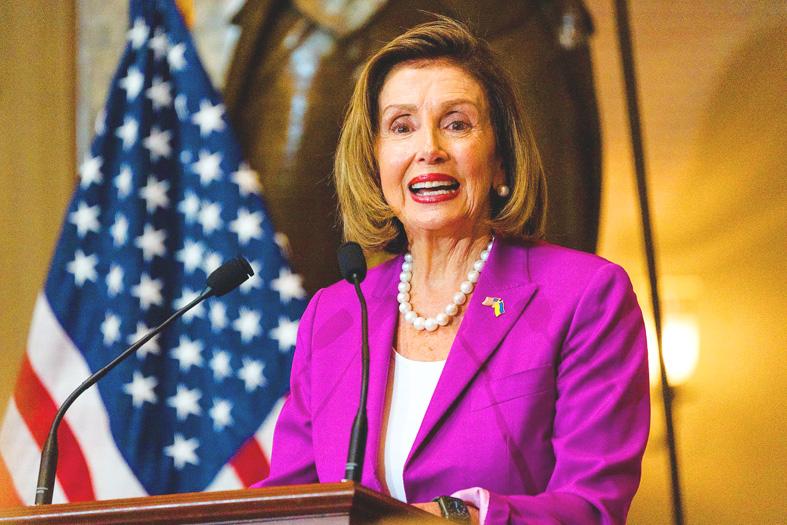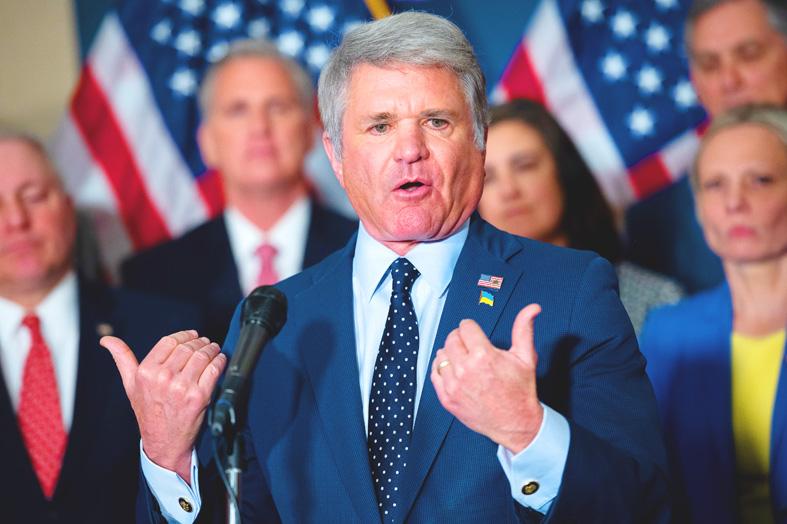US House of Representatives Speaker Nancy Pelosi invited other top lawmakers to join her on a visit to Taiwan, a US representative told NBC News on Wednesday, in the first on-the-record confirmation of the speaker’s planned visit.
US Representative Michael McCaul said in an interview with the US news outlet that he and fellow Representative Gregory Meeks had been invited to join Pelosi on a visit to Taiwan next month.
McCaul, a Republican, is a ranking member of the House Committee on Foreign Affairs alongside Meeks, the Democratic chairman.

Photo: Bloomberg
Although he declined the offer due to a personal obligation, McCaul encouraged others to go.
“Any member that wants to go, should. It shows political deterrence” to Chinese President Xi Jinping (習近平), McCaul said. “But [Pelosi] should also pay attention to the military if it’s going to cause a blowback and escalate things.”
US Representative Anna Eshoo, a Democrat close to Pelosi, also told NBC News on Wednesday that she had received an invitation, but had to decline.

Photo: EPA-EFE
The comments were the first on-the-record confirmation of plans first reported by the Financial Times on Monday last week.
Pelosi’s office and the White House have declined to confirm the trip.
Although no specific dates have been provided, Japan’s Kyodo News yesterday cited foreign affairs sources as saying the trip would take place early next month.
During the brief interview on Capitol Hill, McCaul also called on Washington to reconsider its policy of “strategic ambiguity” toward Taiwan.
“I think it’s gotten to the point where China is such a threat to Taiwan where we need to revisit that policy,” he said. “I don’t think it should be ambiguous anymore. I think China needs to understand that our policy is one to defend and not be ambiguous about it.”
On Wednesday, Premier Su Tseng-chang (蘇貞昌) thanked Pelosi for her long-time support and friendship, and extended an invitation to “any friendly foreign guests” who want to visit.
The government would make careful arrangements for visitors with respect to their plans, he added.
In related news, a US aircraft carrier and its strike group have returned to the South China Sea after a port call in Singapore, deploying in the disputed region as tensions with China rise over a possible visit to Taiwan by Pelosi.
Officials with the US Navy’s 7th Fleet confirmed the deployment of the USS Ronald Reagan to the vital trade route, but did not comment on questions about tensions over the trip by Pelosi.
“USS Ronald Reagan and her strike group are under way, operating in the South China Sea following a successful port visit to Singapore,” US Commander Hayley Sims said in a statement.
Sims added that the Reagan “is continuing normal, scheduled operations as part of her routine patrol in support of a free and open Indo-Pacific.”
Asked for comment, the Chinese Ministry of Foreign Affairs yesterday said the US was once again “flexing its muscles” in the South China Sea with the Reagan’s sailing.
“It is clear from this for everyone to see who is the biggest threat to the South China Sea and the Asian region’s peace and stability,” ministry spokesman Zhao Lijian (趙立堅) told a regular briefing.

SECURITY: As China is ‘reshaping’ Hong Kong’s population, Taiwan must raise the eligibility threshold for applications from Hong Kongers, Chiu Chui-cheng said When Hong Kong and Macau citizens apply for residency in Taiwan, it would be under a new category that includes a “national security observation period,” Mainland Affairs Council (MAC) Minister Chiu Chui-cheng (邱垂正) said yesterday. President William Lai (賴清德) on March 13 announced 17 strategies to counter China’s aggression toward Taiwan, including incorporating national security considerations into the review process for residency applications from Hong Kong and Macau citizens. The situation in Hong Kong is constantly changing, Chiu said to media yesterday on the sidelines of the Taipei Technology Run hosted by the Taipei Neihu Technology Park Development Association. With

CARROT AND STICK: While unrelenting in its military threats, China attracted nearly 40,000 Taiwanese to over 400 business events last year Nearly 40,000 Taiwanese last year joined industry events in China, such as conferences and trade fairs, supported by the Chinese government, a study showed yesterday, as Beijing ramps up a charm offensive toward Taipei alongside military pressure. China has long taken a carrot-and-stick approach to Taiwan, threatening it with the prospect of military action while reaching out to those it believes are amenable to Beijing’s point of view. Taiwanese security officials are wary of what they see as Beijing’s influence campaigns to sway public opinion after Taipei and Beijing gradually resumed travel links halted by the COVID-19 pandemic, but the scale of

A US Marine Corps regiment equipped with Naval Strike Missiles (NSM) is set to participate in the upcoming Balikatan 25 exercise in the Luzon Strait, marking the system’s first-ever deployment in the Philippines. US and Philippine officials have separately confirmed that the Navy Marine Expeditionary Ship Interdiction System (NMESIS) — the mobile launch platform for the Naval Strike Missile — would take part in the joint exercise. The missiles are being deployed to “a strategic first island chain chokepoint” in the waters between Taiwan proper and the Philippines, US-based Naval News reported. “The Luzon Strait and Bashi Channel represent a critical access

Pope Francis is be laid to rest on Saturday after lying in state for three days in St Peter’s Basilica, where the faithful are expected to flock to pay their respects to history’s first Latin American pontiff. The cardinals met yesterday in the Vatican’s synod hall to chart the next steps before a conclave begins to choose Francis’ successor, as condolences poured in from around the world. According to current norms, the conclave must begin between May 5 and 10. The cardinals set the funeral for Saturday at 10am in St Peter’s Square, to be celebrated by the dean of the College